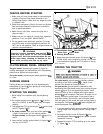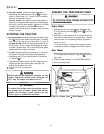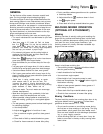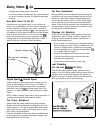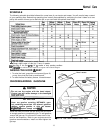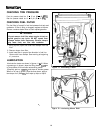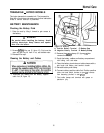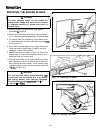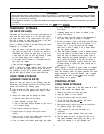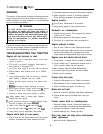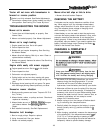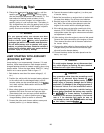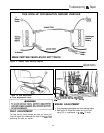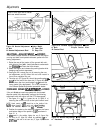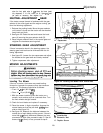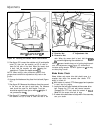
Storage
A
WARNING
Never store the tractor, with gasoline in engine or fuel tank, in a heated shelter or in enclosed, poorly ventilated
enclosures. Gasoline fumes may reach an open flame, spark or pilot light (such
as
a furnace, water heater, clothes
dryer, etc.) and cause an explosion.
Handle gasoline carefully. It is highly flammable and careless use could result in serious fire damage to your person
or property.
Drain fuel into an approved container outdoors away from
ooen flame or
SDSrkS.
TEMPORARY STORAGE
(30 DAYS OR LESS)
Remember, the fuel tank will still contain some gasoline, so
never store the tractor indoors or in any other area where
fuel vapor could travel to any ignition source. Fuel vapor is
also toxic if inhaled, so never store the tractor in any struc-
ture used for human or animal habitation.
Here is a checklist of things to do when storing your tractor
temporarily or in between uses:
l Keep the tractor in an area away from where children
may come into contact with it. If there’s any chance of
unauthorized use, remove the spark plug (s) and put in
a safe place. Be sure the
Spark
plug opening is protect-
ed from foreign objects with a suitable cover.
l If the tractor can’t be stored on a reasonable level sur-
face, chock the wheels.
l Clean all grass and dirt from the mower.
NOTE: If storing your tractor between winter snow removal
jobs in a co/d area, we suggest that you fill the fuel tank at
the completion of each job to prevent water condensation in
the fuel tank. Wait for engine to cool before filling tank.
LONG TERM STORAGE
(LONGER THAN 30 DAYS)
Before you store your tractor for the off-season, read the
Maintenance and Storage instructions in the Safety Rules
section, then perform the following steps:
1.
Drain crankcase oil while engine is hot and refill with a
grade of oil that will be required when tractor is used
again.
2. Prepare the mower deck for storage as follows:
a. Remove mower deck from the tractor.
b. Clean underside of mower deck.
c. Coat all bare metal surfaces with’paint or light coat of
oil to prevent rusting.
3. Clean external surfaces and engine.
4. Prepare engine for storage. See engine owner’s
manual.
5. Clean any dirt or grass from cylinder head cooling fins,
engine housing and air cleaner element.
6. Cover air cleaner and exhaust outlet tightly with plastic
or other waterproof material to keep out moisture, dirt
and insects.
7. Completely grease and oil tractor as outlined in the
Normal Care section.
8. Clean up tractor and apply paint or rust preventative to
any areas where paint is chipped or damaged.
9. Be sure the battery is filled to the proper level with water
and is fully charged. Battery life will
be
increased if it is
removed, put in a cool, dry place and fully charged
about once a month. If battery is left in tractor, discon-
nect the negative cable.
10. Drain fuel system completely or add a gasoline stabilizer
to the fuel system. If you have chosen to use a fuel sta-
bilizer and have not drained the fuel system, follow all
safety instructions and storage precautions in this man-
ual to prevent the possibility of fire from the ignition of
gasoline fumes. Remember, gasoline fumes can travel
to distant sources of ignition and ignite, causing risk of
explosion and fire.
NOTE: Gasoline, if permitted to stand unused for extended
periods (30 days or more), may develop gummy deposits
which can adverse/y affect the engine carburetor and cause
engine malfunction. To avoid this condition, add a gasoline
stabilizer to the fuel tank or drain
a// fuel from the system
before placing unit in storage.
STARTING AFTER
LONG TERM STORAGE
Before starting the tractor after it has been stored for a long
period of time, perform the following steps.
1. Remove any blocks from under the tractor.
2. Install the battery if it was removed.
3. Unplug the exhaust outlet and air cleaner.
4. Fill the fuel tank with fresh gasoline. See engine
manual for recommendations..
-
5. See engine owner’s manual and follow all instructions
for preparing engine after storage.
6. Check crankcase oil level and add proper oil if
necessary.
7. Inflate tires to proper pressure. Check fluid levels.
8. Start the engine and let it run slowly. DO NOT run at
high speed immediately after starting. Be sure to run
engine only outdoors or in well ventilated area.
17



